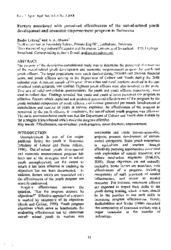Factors associated with perceived effectiveness of the out-of-school youth development and economic empowerment program in Botswana
Abstract
The purpose of the descriptive-correlational study was to determine the perceived effectiveness
of the out-of-school youth development and economic empowerment program by youth and
youth officers. The target populations were youth funded during 2004/05 and 2005/06 financial
years, and youth officers serving in the Department of Culture and Youth during the 2006
calendar year. A random sample of 68 youth from urban and rural locations involved in the out-
of-school youth program, was studied. Eighteen youth officers were also involved in the study.
Two sets of valid and reliable questionnaires, for youth and youth officers respectively, were
used to collect data. Findings revealed that youth and youth officers perceived the program as
effective. Factors which explained and predicted perceived effectiveness of the program by the
youth included competence of youth officers, and income generated per month. Involvement of
stakeholders and number of years in service, explained the effectiveness of the program as
perceived by the youth officers. In conclusion, the out-of-school youth program was effective.
The main recommendation made was that the Department of Culture and Youth should abide by
the strategies it has adopted which made the program effective.

